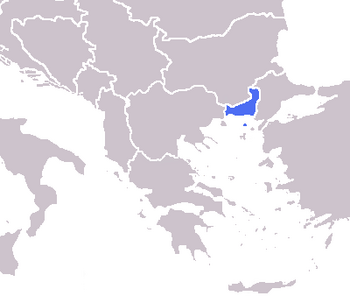United Nations Administration Mission in Thrace: Difference between revisions
No edit summary |
No edit summary |
||
| Line 35: | Line 35: | ||
The UNAMIT was established pursuant to Security Council Resolution 1107, which was passed on 13 May 1998. The Resolution authorised an international civil and military presence in the Western Thrace. In that Resolution, the UN decided to "[deploy] in Western Thrace, under United Nations auspices, [an] international civil and security [presence], to protect civilians and maintain the rule of law." Resolution 1107 passed with the support of Russia – which politically backed Buglaria's claim to Western Thrace – as the withdrawal agreement negotiated between {{wp|NATO}} and the {{wp|People's Republic of Bulgaria}} stipulated that Russian peacekeepers must play a part in any international troop presence. | The UNAMIT was established pursuant to Security Council Resolution 1107, which was passed on 13 May 1998. The Resolution authorised an international civil and military presence in the Western Thrace. In that Resolution, the UN decided to "[deploy] in Western Thrace, under United Nations auspices, [an] international civil and security [presence], to protect civilians and maintain the rule of law." Resolution 1107 passed with the support of Russia – which politically backed Buglaria's claim to Western Thrace – as the withdrawal agreement negotiated between {{wp|NATO}} and the {{wp|People's Republic of Bulgaria}} stipulated that Russian peacekeepers must play a part in any international troop presence. | ||
As per UNAMIT's mandate the NATO-led '''Peacekeeping Force in Western Thrace (PKF-Thrace)''' comprised of 30,000 troops was deployed to Western Thrace the following month. Since the 2000's the force has undergone a significant drawdown – now comprised of only 5,000 troops – with the main force contributors being the {{wp| | As per UNAMIT's mandate the NATO-led '''Peacekeeping Force in Western Thrace (PKF-Thrace/NATO PKF)''' comprised of 30,000 troops was deployed to Western Thrace the following month. Since the 2000's the force has undergone a significant drawdown – now comprised of only 5,000 troops – with the main force contributors being the {{wp|Italy}}, {{wp|United States}}, {{wp|Austria}}, {{wp|Switzerland}}, the {{wp|United Kingdom}}, and {{wp|Ireland}}. The Russian contingent known as the '''Russian Peacekeeping Force (RU PKF)''' – originally numbering 3000 – operates outside of NATO's command, primarily near the border with {{wp|Eastern Thrace}}, the border woth Bulgaria proper, and ethnic Bulgarian areas of Thrace. It has been downsized to 700 troops in recent years. | ||
In addition to PKF-Thrace, since 2012 a 2,000 strong combined force of {{wp|France|French}} and {{wp|Germany|German}} civilian police, gendarmes/military police, and police tactical units – as well as a number of prosecutors and judges – has been deployed to the region under the name of '''European Union Policing Assistance Mission in Thrace (EU PAM)''', to support policing matters and prevent the decline of the rule of law in the territory. | |||
Revision as of 18:23, 27 September 2023
This article is incomplete because it is pending further input from participants, or it is a work-in-progress by one author. Please comment on this article's talk page to share your input, comments and questions. Note: To contribute to this article, you may need to seek help from the author(s) of this page. |
United Nations Administration Mission in Thrace (UNAMIT) | |
|---|---|
|
Flag | |
 Locaiton of Western Thrace | |
| Status | United Nations mission |
| Capital | Komotini |
| Government | |
• UN Special Representative | TBD |
• NATO PKF Commander | TBD |
• EU Police Mission Head | TBD |
| Currency | Euro (EUR) |
The United Nations Administration Mission in Thrace, commonly referred to as UNAMIT, is the officially mandated mission of the United Nations in Western Thrace. The mission was authorized by the United Nations Security Council following the conclusion of the Crskan War to deal with the disputed territory of Western Thrace. The UNAMIT describes its mandate as being to "help the United Nations Security Council achieve an overall objective, namely, to ensure conditions for a peaceful and normal life for all inhabitants of Western Thrace, to facilitate a permanent political solution to the ongoing Greco-Bulgarian territorial dispute, and to further advance regional stability in the Western Balkans."
The UNAMIT was established pursuant to Security Council Resolution 1107, which was passed on 13 May 1998. The Resolution authorised an international civil and military presence in the Western Thrace. In that Resolution, the UN decided to "[deploy] in Western Thrace, under United Nations auspices, [an] international civil and security [presence], to protect civilians and maintain the rule of law." Resolution 1107 passed with the support of Russia – which politically backed Buglaria's claim to Western Thrace – as the withdrawal agreement negotiated between NATO and the People's Republic of Bulgaria stipulated that Russian peacekeepers must play a part in any international troop presence.
As per UNAMIT's mandate the NATO-led Peacekeeping Force in Western Thrace (PKF-Thrace/NATO PKF) comprised of 30,000 troops was deployed to Western Thrace the following month. Since the 2000's the force has undergone a significant drawdown – now comprised of only 5,000 troops – with the main force contributors being the Italy, United States, Austria, Switzerland, the United Kingdom, and Ireland. The Russian contingent known as the Russian Peacekeeping Force (RU PKF) – originally numbering 3000 – operates outside of NATO's command, primarily near the border with Eastern Thrace, the border woth Bulgaria proper, and ethnic Bulgarian areas of Thrace. It has been downsized to 700 troops in recent years.
In addition to PKF-Thrace, since 2012 a 2,000 strong combined force of French and German civilian police, gendarmes/military police, and police tactical units – as well as a number of prosecutors and judges – has been deployed to the region under the name of European Union Policing Assistance Mission in Thrace (EU PAM), to support policing matters and prevent the decline of the rule of law in the territory.